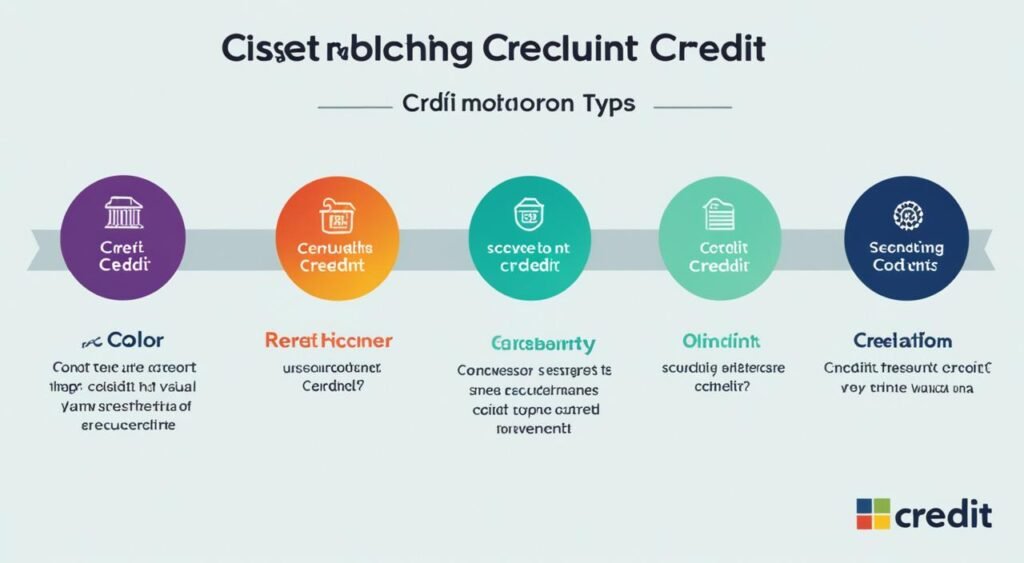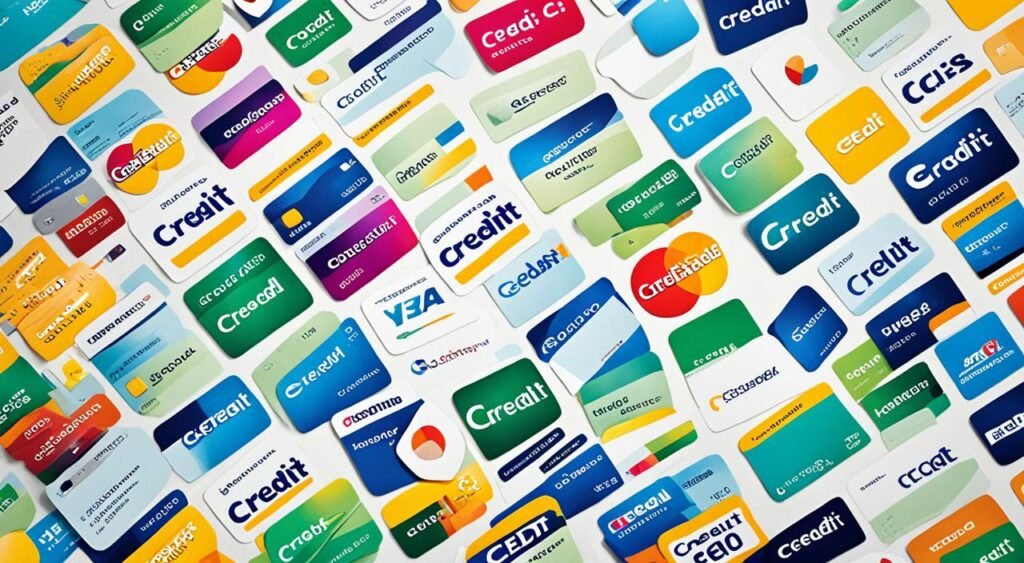What Are The Different Types Of Credit And Why Do They Matter?
Understanding the main types of credit is key for financial health. There are three types: installment, revolving, and open credit. Each affects your credit score in different ways.
Credit is a lender’s trust that you will repay a loan. Good credit lets you buy things with a promise to pay later. You can spread the cost over time, but you’ll pay interest. Your credit score reflects how likely you are to repay loans. This score is calculated from your credit history by Equifax, Experian, and TransUnion. FICO® and VantageScore use this data to score you.
Key Takeaways
- Understanding the three main types of credit – installment, revolving, and open – is crucial for achieving better financial health.
- Credit indicates a lender’s confidence in your ability to repay a loan, and good credit allows you to make purchases over time.
- Your credit history is maintained by the three major credit bureaus and used to calculate your credit score.
- Having good credit can lead to lower interest rates compared to those with bad credit.
- Properly managing different types of credit and maintaining a healthy credit mix can positively impact your credit score.
Understanding the Concept of Credit
Credit signals a lender’s confidence in loan repayment. It shows a person with good credit can be trusted to pay on time. This trust allows someone to buy things and pay later, not all at once.
This system lets you handle payments over time. But it comes with a cost. The lender adds interest, which increases your payment the longer you take to pay back.
Credit as a Measure of Lender’s Confidence
If you have good credit, you enjoy small interest rates. Your credit history is checked by Equifax, Experian, and TransUnion. They collect data monthly for your credit report.
Your credit score is then figured out by FICO® and VantageScore. Prospective lenders use this score to decide if they should lend to you. It also helps determine your interest price.
Benefits of Having Good Credit
Good credit lets you buy things without paying everything upfront. You can settle your purchases slowly, usually every month. But remember, this method adds interest to the payment.
Another plus of good credit is lower interest rates. This means you pay less over time than if you had bad credit.
Role of Credit Bureaus and Credit Scores
The three major credit bureaus keep your credit history up to date. Thanks to Equifax, Experian, and TransUnion, lenders know your financial behavior.
They use this info to make your credit score. Lenders check this score to see if you’re a safe bet for a loan. It helps them decide how much interest to charge.
The Three Main Types of Credit
There are three main types of credit: revolving, open, and installment. Each type has its own way of borrowing and paying back debt. This differs for every type.
Secured vs. Unsecured Credit
Secured credit needs a type of collateral to back it, like a house or a car. This makes it less risky for the lender. If the borrower can’t pay, the lender can take the asset. loans On the flip side, unsecured credit doesn’t require any collateral. Types include student loans, personal loans, and credit cards. Some believe it’s necessary to distinguish credit cards from other loans because they vary in features. unsecured credit Credit cards, in particular, are a special case. This is because not all credit cards offer the same terms and benefits. So, they can’t all be lumped into one group.
Revolving Credit
Revolving credit lets you borrow up to a set amount, pay it off, and then borrow again. This is often seen with a credit card.
You can choose to pay the whole bill or just a part each month. Here, the smallest amount you must pay is a fraction of what you owe. This gives people the choice to chip away at the debt or clear it fully. And as you pay, your available balance increases back to its limit.
How Revolving Credit Works
A revolving credit account sets a credit limit for you to spend. You can pay the full bill every month or a smaller, fixed amount. When you make purchases, the credit utilization rate rises. Yet, by making any payment, your available credit increases back to its original limit.
Examples of Revolving Credit Accounts
Common types of revolving credit include credit cards, store cards, and personal lines of credit. These let you buy things without cash and then repay later. After paying down what you owe, you can spend more within the set limit.
Managing Revolving Credit Responsibly
To make the most of revolving credit, pay the full amount each billing period. This not only saves you from high interest charges but also keeps your credit utilization ratio low. A low ratio is good for your credit score. It’s also smart to always pay on time and keep your balance much lower than your limit. This responsible use will improve your credit report and credit score.
Installment Credit
Installment credit is where you borrow a set amount and pay it back with fixed payments. It includes student loans, car loans, and personal loans. You don’t have a credit limit like with credit cards. Instead, you receive a fixed amount that you then pay back over time.
Understanding Installment Loans
Installment loans are often for buying specific things like a house, car, or smartphone. They can be secured loans. If you don’t pay, the lender can take what you bought. But, personal loans are usually not secured. If they aren’t, they are known as unsecured loans.
Secured vs. Unsecured Installment Loans
For secured loans, the lender can take the item you bought if you don’t pay. This is common for things like mortgage loans for houses or auto loans for cars. However, if you can’t pay back unsecured loans, the lender might not be able to get their money back. That’s why unsecured loans usually have higher interest rates.
Whether an installment loan is secured or not, paying on time is crucial. Also, keeping your credit score and credit report in good shape helps you get better deals on loans in the future.
Open Credit

Open credits don’t usually have a strict credit limit. Payments must be in full every month. The amount to pay can change with how much you use.
Utility bills for electricity, gas, sewer, and water can count as open credit. Through new models, people understand utility payments can affect your credit score. However, only late utility payments hurt your credit.
Utility Bills as Open Credit
Charge cards also fall under this category without a fixed credit limit. You must pay off the full payment every month. Failing to do so can lead to steep fees or a cancellation of your account.
Charge Cards as Open Credit
Knowing about open credit like utility bills and charge cards helps. It allows you to keep a positive credit score and credit report. This keeps your financial situation strong.
Types Of Credit

Installment and revolving credit can both impact your credit score. Missing payments will lower your score. Your payment history is key. It makes up 35% of your FICO score.
How Different Credit Types Impact Credit Scores
How much you owe relative to your credit limit affects 30% of your FICO score. Use your revolving credit wisely. Make big enough payments. Aim to keep your balance low each month. Your credit’s age is also crucial, accounting for 15%.
The types of credit you have matter too, covering 10% of your score. So, having a mix of credit helps your score.
Importance of Payment History
Paying on time is the single most important credit score aspect. It amounts to 35% of your FICO score. Be sure to pay all your debts promptly. This includes installment and revolving credit, as well as open credit accounts.
Missing payments can really harm your score and your whole credit report.
Credit Utilization and Available Credit
How much you owe versus the credit available to you impacts 30% of your score. Keep this in mind when using your credit. Try to keep balances low. This shows credit bureaus you’re reliable.
Building a Diverse Credit Mix

Credit mix is crucial for 10% of your FICO® Score. It shows if you can handle different types of credit. When looking at your credit mix, FICO also checks your payment history for each type.
Benefits of a Good Credit Mix
Imagine having both installment and revolving loans but not paying on time. Your FICO Score will drop because of this bad payment history, which makes up 35% of your score. Also, getting a bunch of new credit at once can hurt your score. Lenders see this as a sign that you might be in financial trouble.
Considerations for Improving Credit Mix
If you’re adding something new to your credit mix, think about the risks. Make sure you’re paying on time for all your different credit accounts. This shows you’re managing your credit responsibly. It includes installment credit, revolving credit, and open credit. Plus, it can boost your credit score and improve your credit report.
Managing Different Types of Credit Responsibly

It’s important to handle various types of credit well. This includes things like credit cards, loans, and bills. Doing this right helps you keep a good credit score.
You should check your credit reports often. Make sure to use your credit, pay bills on time, and have different kinds of credit. This way, your credit score stays high.
Monitoring Credit Reports
Looking at your credit reports every once in a while is key. You should check with Equifax, Experian, and TransUnion. This helps you spot wrong information or things like fraud that could hurt your credit score.
By keeping an eye on your reports, you can fix issues fast. This stops them from hurting your credit profile too much.
Strategies for Maintaining Healthy Credit
Want to keep your credit in good shape? Pay your bills on time. This goes for everything from credit cards to utility bills.
Try not to use up all the credit you’re given. It’s not good for your credit score. Also, watch out for high interest rates. Pay off your credit card balances completely each month. This way, you don’t waste money on interest charges.
Watch your credit reports and use smart strategies for a healthy credit mix. Doing this will help you manage your credit well. Over time, it can boost your credit score too.
Also read: How Does The Credit System Work And Why Is It Important?
Conclusion
In conclusion, knowing about the types of credit is vital for better financial health. It lets you buy things on credit when you might not afford it all at once. Your credit score is important because it shows how likely you are to repay a loan. A good credit score is key for deals that need credit. The credit bureaus – Equifax, Experian, and TransUnion – keep track of your credit history. They use this to figure out your FICO score and VantageScore.
Managing different types of loans well, paying on time, and not using too much credit can keep your profile healthy. When you know about the various credit accounts, it’s easier to handle your payment history. This knowledge can help improve your financial health and make lenders trust you more to handle credit wisely.
FAQs
Q: What are the different types of credit?
A: The different types of credit include revolving credit (e.g., credit cards), installment credit (e.g., auto loans), and open credit (e.g., home equity line of credit).
Q: How do different types of credit affect your credit score?
A: The types of credit accounts you have impact your credit score by affecting your credit mix and history, which are factors considered in calculating your credit score.
Q: Why does the variety of credit matter for building credit?
A: Having a variety of credit types, such as a mix of installment and revolving credit, can demonstrate your ability to successfully manage different types of credit accounts, which can positively impact your credit.
Q: What is a secured credit card and how does it help build credit?
A: A secured credit card requires a security deposit and is designed for individuals with limited or poor credit history. By using a secured credit card responsibly, you can build or rebuild your credit.
Q: How do different types of credit cards affect your credit?
A: Different types of credit cards, such as secured or unsecured cards, impact your credit based on how you manage them. Making on-time payments and keeping balances low can have a positive impact on your credit.
Q: What are the three main types of credit accounts that affect your credit?
A: The three main types of credit accounts that can affect your credit are revolving credit accounts (credit cards), installment credit accounts (loans), and open credit accounts (lines of credit).
Q: How does credit affect your credit score?
A: Your credit history, which includes the types of credit you have and how you manage them, plays a significant role in determining your credit score. Responsible credit usage can help improve your credit score over time.
Source Links
- https://www.self.inc/blog/types-of-credit
- https://www.myfico.com/credit-education/credit-scores/credit-mix
- https://corporatefinanceinstitute.com/resources/commercial-lending/types-of-credit/
